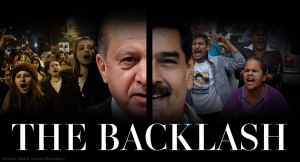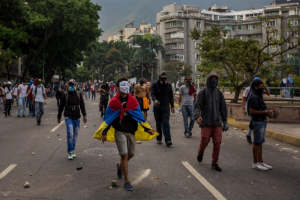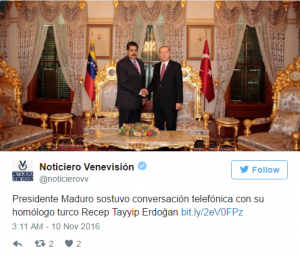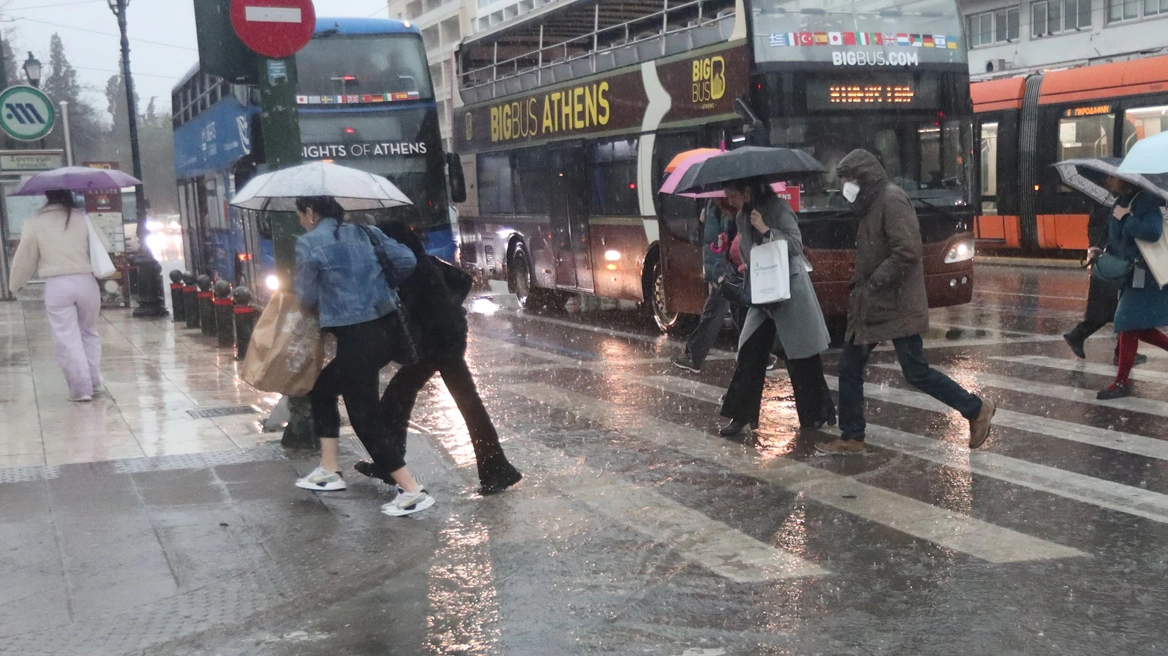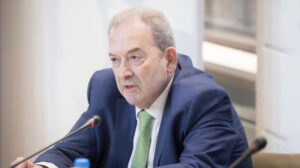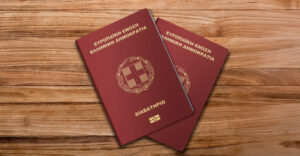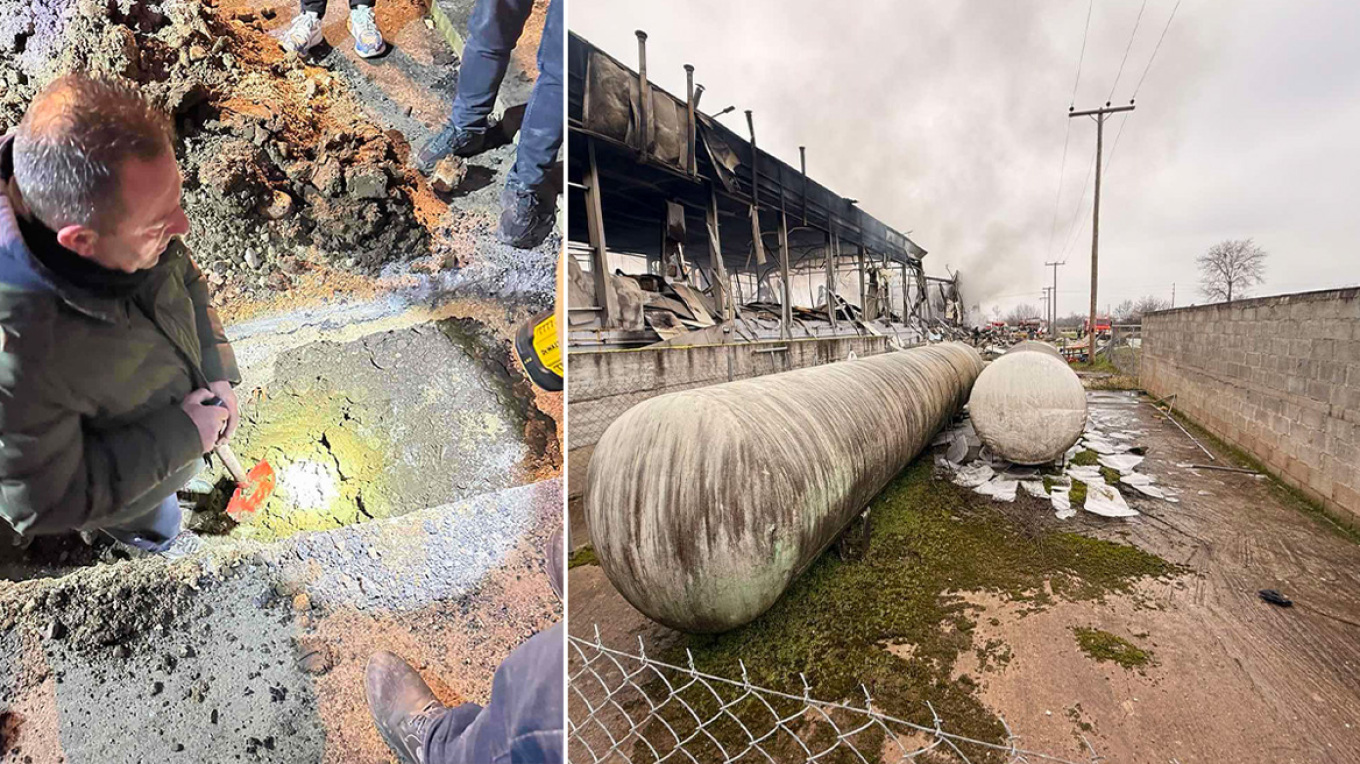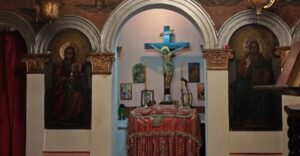The entrenched and embattled presidents of Venezuela and Turkey may live worlds apart, but their tenures in office are acquiring striking similarities.
Both see foreign plots aimed against them and whip up their supporters by warning of coups. Both preside over deeply divided countries and seem to benefit from stoking polarization. And both are clinging to power even as their nations drift into crisis and deeper economic turmoil.
To be sure, Venezuelan President Nicolás Maduro’s grip is weaker than that of Turkish President Recep Tayyip Erdogan. Maduro’s government has been buffeted by weeks of mass protests, launched after the country’s Supreme Court stripped the opposition-dominated National Assembly of its powers last month. The decision was reversed days later but not before unleashing widespread outrage.
“That, on its own, is enough to bring people into the streets,” said my colleague Amanda Erickson. “But many Venezuelans are already at the breaking point. Food shortages have left much of the country hungry, and access to basic goods and medicine is intermittent at best. Inflation is spiraling out of control, and crime is a daily reality. Corruption and mismanagement have squandered the country’s vast oil reserves.”
The sprawling economic crisis has had real and shocking effects: Three-quarters of respondents to a national survey reported an average loss of 19 pounds in body weight between 2015 and 2016, a result of chronic food shortages. In that same time frame, the rate of Venezuelans eating two or fewer meals a day tripled, making up as many as 10 million of the country’s 30 million people. Blackouts are increasingly common, medical facilities are collapsing, and rates of infant mortality and infectious diseases are rising.
Maduro has pinned the blame for Venezuela’s woes on a meddling opposition guided by a foreign (read: American) hand, and mobilized counter protests as well as pro-government militias known as “colectivos.” The opposition is demanding that these groups be disarmed, political prisoners be released and a fresh presidential election be held — and they say they won’t stop protesting until those demands are met. The unrest has led to 28 deaths this month, with both sides blaming the other for the violence.
The opposition, as my colleague Nick Miroff wrote, may hope their “ability to summon huge crowds also sends a message to Venezuela’s armed forces” and raises the stakes for Maduro, whose hold on power is increasingly dependent on the loyalty of security services. Opposition figures have been issuing public calls to soldiers to defy Maduro’s orders to crackdown on the protests.
“By putting thousand and thousands of people in the streets almost every day, they’re trying to keep the cost of supporting Maduro very high for the armed forces,” said political analyst Margarita López Maya to my colleagues. “And the government is in a slide that looks irreversible.”
Maduro lacks the charisma of his predecessor, the late Hugo Chávez, whose populist revolution was tethered to global oil prices and has now foundered amid mismanagement and cronyism. But Maduro is showing few signs of listening to his critics at all, let alone allowing new elections.
So why the comparison to Erdogan? For one, the Turkish leader is similarly unwilling to brook dissent.
After a failed coup attempt against his rule last July, Erdogan and his government conducted an astonishing purge of state institutions and civil society, arresting and sidelining tens of thousands of people — including many who likely had little or no connection to the coup plotters. On Wednesday, Turkish authorities announced the detention of 1,000 more people.
And, indeed, Maduro has found inspiration in Erdogan’s crackdown. “Did you see what happened in Turkey?” said Maduro, in a televised public event last August. “Erdogan will seem like a nursing baby compared to what the Bolivarian revolution will do if the right wing steps over the line with a coup.”
The two leaders also share a pugnacious style. Earlier this month, Erdogan narrowly won a referendum that will scrap Turkey’s parliamentary system and bestow vast new and mostly unchecked powers upon his presidency. When European election monitors raised questions about the fairness of the vote, Erdogan rounded on them, advising that they should “know their place.”
The buildup to the referendum saw Erdogan locked in various rhetorical battles with foreign governments, particularly a few in Western Europe, and constant allusions at home to the threat posed to Turkey’s interests by “crusaders” and “Nazi” Europeans. His repeated tactic is to rally a nationalist base against enemies, imagined and real, elsewhere. This is also a common theme in the populism of the regime that Chavez built and Maduro now seeks to preserve.
“We tend to think of Erdogan on the right and the Venezuelan revolution on the left, but the approach to how you do politics is just so familiar,” said Francisco Toro, editor of the Caracas Chronicles news website, in a recent (and interesting) podcast.
But despite their majoritarian rule, the political reality for both Maduro and Erdogan is one of profound uncertainty. Mounting international pressure, never mind sustained dissent on the streets, may leave Maduro with few cards to play.
And while Erdogan is in a far stronger position, the referendum may yet prove to be a Pyrrhic victory. The slender margin of his camp’s win — and the taint of irregularities — deprives Erodgan of the unifying mandate he hoped to win. He may have fewer scapegoats to blame as Turkey’s accumulating security and economic troubles, including the cratering of its tourism industry, add up. Observers also now see an opportunity for Turkey’s long-splintered opposition to find a new unity ahead of 2019 elections.
For Erdogan and Maduro, both seemingly bent on staying in power, there may be many sleepless nights ahead.
Ask me anything
Explore related questions
